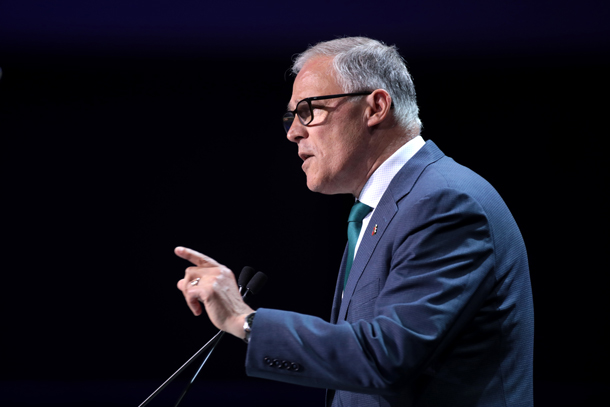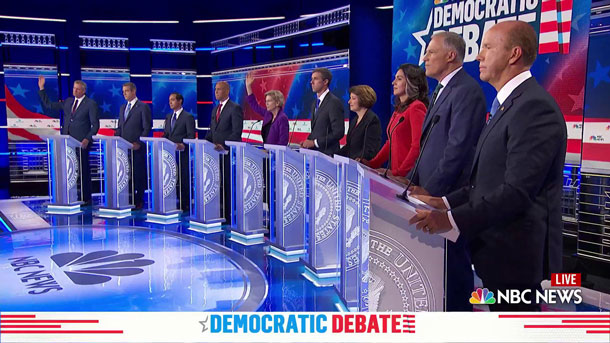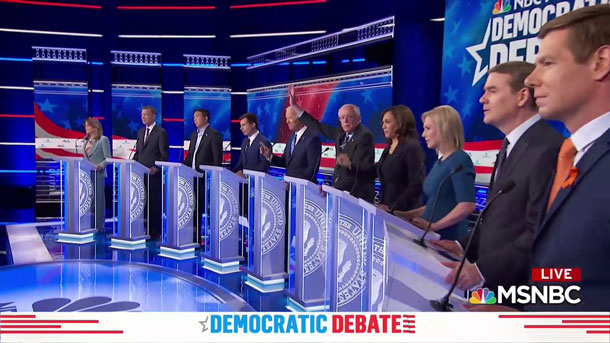Not Much Presidential Debate About Climate
Air Date: Week of July 5, 2019

Washington Governor Jay Inslee is the only current Democratic presidential candidate whose major political platform is focused on climate change. (Photo: Gage Skidmore, Wikimedia Commons, Gage Skidmore from Peoria, AZ, United States of America, CC BY-SA 2.0)
This week, Peter Dykstra joins Host Steve Curwood to talk about how climate change, a key concern these days for Democratic voters, fared in the first series of Democratic debates held on 2 consecutive nights. To the dismay of some candidates and activists, climate change received just 15 minutes in 4 hours, and half of the 20 candidates onstage did not say anything about climate at all. Now the Democratic National Committee appears to be reconsidering its refusal to hold a dedicated climate change debate.
Transcript
CURWOOD: For a look at how the Democratic candidates for president here in the United States debated over climate action, we turn now to Peter Dykstra. He's an editor with Environmental Health News, that’s EHN.org and DailyClimate.org. Peter's on the line now from Atlanta. Hi there, Peter!
DYKSTRA: Hi, Steve.
CURWOOD: So, Peter, 20 of the Democratic contenders for the White House recently appeared in back to back debates of 10 each, hosted by NBC and MSNBC. And, polling suggests a large majority of likely Democratic primary voters are concerned, if not outright alarmed by climate disruption, but I'm not sure they got a whole lot to go on from these debates. What do you think?
DYKSTRA: I think you're right. The differences between that huge number of candidates on climate change and environment are minor when you compare those differences to the differences between any of them as an opponent next year to President Trump.
CURWOOD: So, we haven't heard much about climate in presidential debates for a while. Right?
DYKSTRA: Right. In the final debates, the Republican nominee versus Democratic nominee, we haven't had a question asked about climate change since 2008, when the moderator bungled the question, and Senator McCain and Senator Obama both kind of avoided the answer and talked about energy independence, instead of climate change.
CURWOOD: How much time was devoted over the four hours of the two debates to climate disruption?
DYKSTRA: 15 minutes out of four hours. One night for eight minutes, one night for seven minutes.

The democratic debates were held over two nights to accommodate the 20 Democratic presidential candidates. (Photo: MSNBC on Twitter | @NBCNews)
CURWOOD: I mean, there were 20 people involved, that's not exactly a whole lot of room.
DYKSTRA: About half of them didn't get to say anything at all about climate change.
CURWOOD: So what about the ones that did?
DYKSTRA: The ones that did, the questions were not so hot, and that's been pointed out in a lot of different places. 10 of the candidates were asked about the biggest geopolitical threat. Four of the 10 said it was climate change, which to me means six of the 10 didn't say it was climate change. Then you've got Governor Jay Inslee of Washington State, you had him on the program here several weeks ago, the fact that he has identified climate change as his signature issue, as the reason he's running for president was treated almost like a novelty in these debates, and maybe elsewhere in coverage of the campaign.
CURWOOD: Yeah, sure gave me the impression as I was watching that, they said, ‘Well, now Governor Inslee we're going to give you something that you really like.’ But that they were like, pigeonholing him on this question, and said, 'Hey, go climb into that pigeonhole.'
DYKSTRA: Yeah, he's focusing on the existential threat of the 21st century. And, isn't that adorable?
CURWOOD: [LAUGHS] Indeed. So, even though majority of Democrats say they care about climate change, they care about it less than...?
DYKSTRA: Less than guns, less than terrorism, less than the economy, less than immigration, less than health care, and probably a few other things thrown in there.
CURWOOD: What is it about American politics that climate change as a subject is really constipated in our political process right now?
DYKSTRA: Well, this is something that's not absolutely unique to America, but it's a stronger and more negative force in this country than anywhere else in the world. And, that's that we pose climate change as a left versus right, Republican versus Democrat, conservative versus liberal issue. It shouldn't be that, and as long as it's that, it's going to be viewed as a political issue, not a science based crisis.
CURWOOD: What's the problem here? I mean, today, for example, the United States is the world's largest producer of oil and gas. And, obviously, that has an impact among Republicans. But what kind of impact do you think it has among the Democrats?
DYKSTRA: It's hard to say what that impact is. I think the big impact that's right in front of us is that climate change still isn't polling well with the public. That's a chicken or egg thing. Is the public not sufficiently alarmed about the potential damage of climate change because it's not covered in the media? Or is the media not covering it because the public isn't sufficiently alarmed?

Out of four total hours of debate, only about 15 minutes were spent discussing topics related to climate change. (Photo: MSNBC on Twitter | @NBCNews)
CURWOOD: There's been quite an outcry among some of the Democratic candidates and activists that the Democratic Party should have a debate devoted to the climate. You know, given the paucity of discussion in this last set of debates, they have something of a case. And I gather, there's been some movement on this subject, that the Democratic National Committee, which has said no to the process, maybe moving more towards maybe?
DYKSTRA: Yeah, it's definitely maybe right now, as of this past week. The Democratic National Committee has responded to a lot of the complaints and displeasure that climate change did not rate its own debate by keeping the issue open. They're going to meet again in August and possibly at that time, they may decide whether to hold an exclusive debate that just focuses on climate change. They've got close to a year to put that one on. So time certainly isn't an issue. But the will to make this as big an issue as many of us think that it is, is still open to question.
CURWOOD: Thanks, Peter. Peter Dykstra is an editor with Environmental Health News. That's EHN.org and DailyClimate.org. We'll talk to you again real soon.
DYKSTRA: Okay, Steve, thanks a lot. We'll talk to you soon.
CURWOOD: And, there's more on the Democratic Party debate about climate change on the Living on Earth website, LOE.org.
Links
The Washington Post | “The Energy 202: DNC will consider holding a climate debate amid protests”
Living on Earth wants to hear from you!
Living on Earth
62 Calef Highway, Suite 212
Lee, NH 03861
Telephone: 617-287-4121
E-mail: comments@loe.org
Newsletter [Click here]
Donate to Living on Earth!
Living on Earth is an independent media program and relies entirely on contributions from listeners and institutions supporting public service. Please donate now to preserve an independent environmental voice.
NewsletterLiving on Earth offers a weekly delivery of the show's rundown to your mailbox. Sign up for our newsletter today!
 Sailors For The Sea: Be the change you want to sea.
Sailors For The Sea: Be the change you want to sea.
 The Grantham Foundation for the Protection of the Environment: Committed to protecting and improving the health of the global environment.
The Grantham Foundation for the Protection of the Environment: Committed to protecting and improving the health of the global environment.
 Contribute to Living on Earth and receive, as our gift to you, an archival print of one of Mark Seth Lender's extraordinary wildlife photographs. Follow the link to see Mark's current collection of photographs.
Contribute to Living on Earth and receive, as our gift to you, an archival print of one of Mark Seth Lender's extraordinary wildlife photographs. Follow the link to see Mark's current collection of photographs.
 Buy a signed copy of Mark Seth Lender's book Smeagull the Seagull & support Living on Earth
Buy a signed copy of Mark Seth Lender's book Smeagull the Seagull & support Living on Earth

